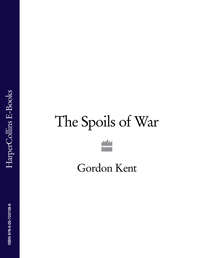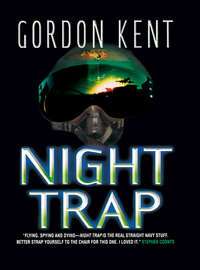
Полная версия
Force Protection
‘I know that.’ She smiled; he smiled; the smiles meant that under certain conditions you certainly could lean on the media, but this wasn’t one of the conditions.
Then Dukas pushed his heavy body to Kasser’s office, summoned by a phone call that to him was three hours late. He didn’t smile this time but shook the other man’s hand, took note of the wall of citations and certificates and trophies without acknowledging them, and sat. He preferred Geraldine Pastner’s dogs.
‘Okay,’ Kasser said, ‘it’s this ship at Mombasa.’ He was sixty, a career NCIS man, deputy to the overall honcho.
‘Right. I left you a mes –’
Hand held up to stop him. ‘I got it. You got bumped by CIA and the Bureau.’ He sat back, joined his hands, looked up at Dukas. ‘They want it.’
‘Like hell.’
‘That’s what my meeting was about: they want it. “Major international incident, part of worldwide movement, big picture; NCIS lacks the facilities, the personnel, the experience, the –”’
‘That’s bullshit!’
Kasser smiled. ‘Not the word I used.’ He had been a special agent for a long time. Now he was polished a lot smoother than Dukas, but he was still a Navy cop. ‘Make your case, Mike.’
Dukas hadn’t thought he’d have to do so. He thought the case made itself. Still – ‘This is a Navy service ship, considered as Navy property. In this situation – any war or combat situation – it falls under the command of the local authority, who in this case is the commander of BG 9, now the flag on USS Jefferson.’ He tapped the desk. ‘I checked with legal.’ Kasser nodded. Dukas went on. ‘Explosion, cause not yet known, but TV says a bomb, and we got no better information. But that’s what we need to investigate, right? No, this is not, repeat not, an Agency or a Bureau matter! They’ll get the reports; we’ll share with them just as generously as they share with us –’
‘Now, now –’
‘They think information comes in suppositories and should go up their ass for safekeeping.’
Kasser grinned and then got serious again. ‘There was also somebody from State at my meeting, plus two guys from the Joint Chiefs. They’d rather work with the Bureau.’
‘They’ve got nothing to do with it!’
‘They say they have. They’re saying what everybody on the TV is saying – Islamic fundamentalists, Islamic extremists, whatever. There’s already pressure to carry out a punitive strike.’
‘Without an investigation?’
‘Osama bin Laden. They’ve got a contingency plan.’
‘This only happened a few hours ago!’
‘It isn’t just this one – there’s a whole string of stuff. They want to use this one as motivation to make a punitive strike.’
‘They call for a punitive strike before there’s proof, and they’re wrong, this country looks like shit! What’d they do the last time – they blew up a pharmaceutical factory in Sudan! We’re not goddam Nazi Germany!’
‘The Agency and the Bureau say they can have the proof in seventy-two hours.’
Dukas banged his fist on the arm of his chair. ‘This is a Navy ship; we’re a Navy investigating unit; we do our own work. CIA and FBI stay out.’
Kasser looked at his hands again. ‘Tell me why I should send you.’
‘Because – Because I don’t belong in the office doing routine.’
Kasser nodded. ‘And because you got shot and you want to prove to yourself that you’re okay.’
Dukas shrugged.
‘You refused counseling, Mike.’
‘So would you have. What do I need counseling for?’
‘Post-trauma.’
‘Bullshit.’
‘Statistics show –’
‘I’m not a statistic! I want a job!’
Kasser swung around to look out his window at the tops of trees, blowing now in a warm wind. He sighed. ‘Okay, you got the case for now – for as long as I can fight off the Bureau and the Agency. What’s your plan?’
Dukas, suddenly sweating, ran through it: team, schedule, forensics, support. ‘I can be there tomorrow,’ he ended.
Kasser nodded, but he was frowning as if the most important thing hadn’t been said. ‘CIA will have somebody onsite before you get there – they’ve got a station there, can’t be helped. The Bureau, too – they’re international now. We can insist that you’re in charge for a while. But if you find something that doesn’t go along with what they want to find, you’re going to have a hell of a time.’ He pointed a finger. ‘You go, and go as fast as you can. You hit the ground running. I’m not going to be stampeded, Mike, but I think we can hold the line for only a few days. Maybe a week. Okay?’
Dukas jerked his head. ‘Okay.’
He held out his hand. ‘Go.’
Dukas went.
Houston.
For Rose Siciliano Craik, the television sets were like needles some malign power had left to jab her with. She’d manage to forget her husband and the idea that he might be dead, and then she’d pass a TV and would see some part of the Kilindini footage, and he’d be back at the front of her mind.
She had dropped the kids off and spoken with their teachers, and she had come on to NASA and spent her obligatory time with a woman in security. The idea that somebody who had blown up a ship in Africa would also reach into a day-care center in Houston seemed absurd. Dukas had said they had to ‘take precautions.’ Whatever that meant. Arm all the six-year-olds? String razor wire around day care?
‘I’ve got a weapon in my car,’ Rose told the security officer. ‘NCIS recommendation.’
‘Not on the base, I hope!’
‘It’s locked.’
‘That’s against the rules, very much against the rules, Commander.’ Rose thought that was a peculiar view for a security officer to take, but she was only beginning to glimpse the culture around her. It was more about rules and conforming and looking good than she had suspected. Or, a traitorous voice whispered in her mind, than she liked.
The security officer said that Rose was safe on the base and there was no reason for a gun. Rose volleyed back with an offer to check her handgun in and out every day at the gate. She would be a good little astronaut, but off base she wanted the gun. The security officer frowned and said that unfortunately she had no control over what Rose did off the base, but she advised against carrying weapons.
‘I’m not carrying it.’
‘Semantics.’
The security woman got on to Rose’s boss, a Colonel Brasher, and made an afternoon appointment to meet with somebody whose title was Director of Personnel Education, although she’d already learned a lot about the educating that went into the making of an astronaut, so she concluded that ‘education’ in this case probably meant something else. Like fitting in or getting along.
‘Fine,’ she said with a bright smile. She could feel the phoniness of the smile, like something she’d glued on. She hated that smile.
She was in the gym when they pulled her out for an ‘urgent’ phone call. She thought at once of her kids – a kidnapper? an attacker? – and then of Alan, and then of her mother.
It was Rafe Rafehausen, calling from the Jefferson.
‘Nothing yet, Rose, but I wanted you to know we’re trying. We can’t get a secure channel.’
‘Thanks, Rafe. Any idea how he is?’
‘I figure no news is good news. He’s tough, Rose.’
They were all tough. That was what they got paid for. Life was tough; they were tough. Rafe had a paraplegic wife who was pregnant; she was tough, too. She thought of her mother, who was not tough, who was a whiner, who couldn’t see beyond the end of her own comfort.
‘Keep me informed, will you, Rafe?’
‘The minute I know anything.’
Walking back to the gym, she decided she’d get a book on Alzheimer’s. Not for her mother’s sake, but for her father’s, because he was the one who was going to have to be tough.
Mombasa.
For the old silversmith whom Alan had visited that morning, who was not really old but was an ‘old man,’ an mzee, because he owned his own shop and had three sons, the hospitals were hell. He had always stayed away from doctors, cured himself with traditional remedies, avoided the clinics where Western medicine and modernity were doled out together, and now he was in a hospital and it was, as he had known it would be, hell.
This was his third hospital today. He had let his second son lead him through the streets from hospital to hospital, allowing himself to be pushed into doorways, pulled down behind a barricade, urged into a trot to escape the trucks and the soldiers. They had walked or run everywhere; there were no taxis, no cycle-jitneys, no matatus. Chaos. He wanted to go inside his house and shut the great wooden door and wait until it was over.
Instead, he was in hell. Hell had green walls, scuffed and nicked and stained, marked today with new blood in smears and spatters. Hell had a slippery floor where there was hardly room to place his small feet because human bodies had been put down everywhere. Mostly men’s bodies, young men, but some women, some children. Bleeding. Bandaged, some of them, with cloth torn from garments and now sodden.
Hell had four one-storey buildings with signs outside that said, in English and Swahili, ‘Maternity,’ ‘Outpatient,’ ‘Surgery,’ and ‘Wards.’ The signs meant nothing today, because the floor of every building was covered with human bodies. The wards were full; the families who had come to feed relatives who were regular patients shrank back around the beds as if protecting the sick from the wounded. The sick who were not already in the wards sat or lay in the shade of the acacias between the buildings and waited, their cancers and tuberculosis and AIDS and childbirth pushed aside by the inhabitants of hell.
The old man plodded between the lines of the wounded. He had small feet shod in heel-less slippers; he pulled up the skirts of his kanzu with his fingers to keep them out of the blood and dirt, thus revealing the feet and the slippers. His fingers wore silver rings, because he was a silversmith. He looked into faces as he stepped over ankles, shoes, bare feet.
Every young man looked like his son but was not his son. When, at last, he found his son in the Maternity building, his son was dead.
3
USNS Jonathan Harker.
The Harker lay at a twelve-degree angle, canted away from the dock with her portside deck edge awash, bowdown, a third of her keel on the mud of the bottom. More than six hundred feet long, she had been breached two hundred feet back from her bow, her slightly forward superstructure taking much of the force of the explosion. The portside wing of the bridge was now tangled steel; her radars were shorn off; her forward boom had broken at the hull so that it had swung up and back and pitched down again on the dock. Steel cable writhed along the deck, its whipping path marked by smashed boats and, at one place, a pool of blood, dried now to the color of oily rust.
Alan Craik, on what had been the starboard wing of the bridge, was looking down into this metal snakes’ nest. His face was streaked with smoke and dirt now, his knit shirt black with sweat. A Navy-issue compress was taped over his right side. After four hours on board, he looked both exhausted and eager, worn out and yet still keyed up.
It was three-quarters of an hour since the first SH-60s had arrived with the Jefferson’s Marines and medics, touching down at the far seaward end of the dock under Kenyan Navy cover, the Marines boiling out to secure first the landing area, then the dock itself, in leapfrogging moves that took them to the Harker. Now four Marines in combat gear guarded the deck below him, while medics worked to bring up bodies and what they hoped would be living sailors from below. The smell of burned rubber and hot metal still gripped the air. In the shade of the superstructure, the fittest of Harker’s crewmen crouched like refugees, spent from fighting the fire down below and trying to save their ship. Their wounded comrades had already been lifted off in an SH-60 heading for the Jefferson’s shipboard hospital.
Halfway along the Harker’s starboard side, a companionway had been jury-rigged back into usefulness, connecting the ship again to the dock. Aft, a damagecontrol assessment team were working their way forward, compartment by compartment. Outboard of the drowned port rail, two SEALs were in the water where the damage was worst.
‘What’s the situation down there now?’ Alan said, jerking his head toward the chaos of the deck. Next to him, the engineering officer of the Harker was just back from a tour below.
‘No electric, so no lights; water to level three everywhere forward of frame seventeen on the port side. Damage to the starboard side not assessed, but the senior chief from your carrier thinks there’s whole frames twisted down there. Two compartments are still too hot to get into. There’s some smoke – I was coughing like crazy down near the anchor locker. Something burning down there smells like truck tires. We got a Kenyan guy with acetylene from the dock; he’s trying to cut into the compartment where we think the, uh – where we think –’ He swallowed. ‘Where they may be.’ He meant the admiral and those with him.
Alan had ordered a search of every space on the ship they could safely go into. They – the admiral, his lieutenant, the ship’s captain, and Laura Sweigert – hadn’t been found. The other ship’s officers were thought to be ashore, but nobody was sure; of the crew of twenty, six were known dead, a half-dozen more injured badly enough to need hospitalization, five still working.
To Alan’s right sat the dock, littered with debris. On the far side, a Toyota pickup that had been chained to the deck of the Harker was upside down. Steel cable wound from the ship to the dock and back as if it was growing there, a gray vine; two corrugated-iron sheds on the dock were crushed front-to-back; a crane had been swiveled on its base and tilted at an angle away from the ship; meat and vegetables were everywhere, rotting now in the heat. Windows had been blown out all along the dock. Far up to his right, the Kenyan Navy had moved two trucks across the chain-link gate at the entrance to the docks and had taken up positions there, blocking the crowd outside from entering. Behind him, far beyond the cranes where the sniper had lurked, the remaining helo from the Jefferson was waiting, rotors turning, ready to take off at the first sign of trouble. With the other SH-60, it had come in over the water, avoiding the land areas where somebody with a shoulder-fired missile might lurk. Six body bags were lined up in its shade. In one of them, Alan knew, was all that remained of Master Chief Martin Craw.
‘How soon will they know whether they’ve found them?’ he said.
A head appeared over the rail one level above them. ‘Hey, Commander!’
It was Hansen. He was still trying to make sense of the ship’s communications. He had rigged sound-powered phones aft and down where the damage was, their lines adding to the confusion of the deck. Alan now had one headset that was more or less patched into Hansen’s radio link to the outside, another that was more or less patched into shipboard phones, although sometimes one worked and sometimes one didn’t.
‘Sir, I’m catching shit from your carrier. They say Washington’s trying to reach you and we got no secure channel. I’m working on it as fast as I can! They’re gonna have to go through the carrier, is all –’
‘Fine – that’s fine! Do the best you can.’ He turned back to the ship’s officer. ‘Sorry – where were we? Oh, yeah – how soon will we know something?’
‘Can’t say.’ The Harker’s engineering officer was a short, middle-aged man who had been far aft when the explosion had happened. He was uninjured but in shock, Alan could see; he was trying to act normal, but he kept giving himself away with a forced casualness that was grotesque in the presence of the body bags and the wreckage.
‘I want you to go see a medic, Mister Barnes.’
‘Hey, no way! This is my ship. I’m fine!’
‘You’ve done great, but I want you to get yourself looked at.’ He deliberately kept his tone light.
‘Hey, no problem. I just –’ Barnes’s careful cheerfulness vanished as his head snapped around: somebody had just started up from the gaping hole in the deck. But it was only one of the medics, coming up to cool off in the Mombasa heat. ‘Oh. I thought – you know –’
The comm man’s head appeared above Alan, one level up on the superstructure. ‘Mister Craik, I got the STU patched in. Can you talk to the Jefferson’s chief of staff on six? He’s hot to trot, man.’
Alan waved and pressed the earphone to his right ear.
‘Craik here, sir.’
‘Stand by for Captain Beluscio.’
He had already had two nonsecure conversations with the chief of staff. Alan had heard the man’s tension even over the raspy radio link, remembered Beluscio’s reputation for nerves. Beluscio had been an F-18 pilot, and a good one, they said; the tenseness hadn’t showed until he had got a squadron command. Then it had got worse with each promotion. Odd.
‘Craik! Captain Beluscio.’
‘Sir.’
‘Are we finally secure?’
‘My comm man says so, sir.’
‘Christ, at last. Any news on the admiral?’
‘Negative.’
‘What’s the situation?’
Alan told him pretty much what Barnes had told him and added that the Kenyans now had the gate under control and the sporadic firing out there had quieted.
‘That’s only local,’ Beluscio said. ‘We’ve got reports of massive rioting elsewhere in the city. Naval attaché says intel there is sure this is local Islamic fundamentalists – something called the Islamic Party of Kenya.’
Alan wanted to laugh, didn’t, and too late realized he should keep his mouth shut, because by then he was saying, ‘Pretty unlikely, sir; IPK isn’t fundamentalist and they aren’t the kind of –’
‘These people are experts, Craik! Don’t argue with me.’
‘Yes, sir.’
‘I want the area cleared of everybody but my Marines as soon as humanly possible. Evacuate people to your det area at the airport if you have to, otherwise, send them back in the choppers. You in touch with your det? I want them back here, too.’
‘Sir, they’re in a secure area at the airport –’
‘Goddamit, I said don’t argue with me! I’m dealing with the big picture here! You get your ass out of there and organize removal of all personnel but my Marines, period! Got it?’
‘Yes, sir.’
Then Beluscio made him repeat it all. Alan didn’t say that he had secret orders to stay in Mombasa from a level higher than Beluscio’s. Well, he’d deal with that when he’d got himself to the det spaces at Mombasa airport. One thing at a time.
‘Anything on the admiral?’ Beluscio said.
‘They’re cutting in with acetylene. They should know something soon.’ He didn’t bother to say that if the admiral was in a space so close to the blast that they had to use acetylene, he was gone. Well, maybe he wasn’t there. Maybe he was – somewhere. And Laura?
Nobody was sure where they had been on the ship, but a wounded sailor had seen the admiral, an aide, the captain, and a woman heading down a ladder one level up and slightly aft of what was now the point of maximum damage. Where there was now a large hole in the hull; where, two levels up, the side was bent in as if a fist had punched it; where, along the deck, rivets had popped and steel plates had been lifted into the air, to land on the dock and in the water, dozens of yards away. Where they had found the mangled bodies of two crewmen.
When he spoke now, Beluscio’s voice was bleak, the voice of a man who knew that he was in over his head. ‘Keep me informed.’
Alan started to say something then, because he saw activity around the hatch by which the medics were getting down to the worst area. He started to tell Beluscio to hang on, that some news might be coming, and then he decided it was better to wait. No point in adding to the man’s tension. Instead, he handed the comm set to Patel, and he went to the forward rail of the bridge and looked down at the scene below. Overhead, a Kenyan Navy ‘gunship’ – an ancient Westland Wasp retrofitted with gun pods – whupped and chuffed its way landward, hunting for shooters.
Beside him, Barnes was leaning a lot of weight on the same rail. Trying to follow the chopper’s progress, he looked distinctly worse – eyes hot, skin pasty, sweat only a thin film despite the Mombasa heat.
‘Patel!’
‘Sir.’ Patel’s cinnamon skin seemed chiseled, his lean face intent.
‘Take Mister Barnes aft to the medic station and get him immediate attention.’
‘Hey –’ Barnes protested.
‘Do it!’
Below him, a black medic had pulled himself out of the distorted hatch opening. He glanced up at Alan, then looked away as if guilty. Another man was looking down into the hole, reaching forward. A third medic appeared, and together they began to wrestle a litter up from below. It held a body bag.
The black medic, the one with the guilty look, made his way to the ladder and began to climb toward the bridge. Alan watched the litter and the body bag come out. Two men were straining from below, two lifting from above. Finally, they got it over the edge of the hatch and hauled at it until more than half was beyond the edge and the two on the deck could rest, part of the body bag still sticking over the open hatch, and they stood there, bent over, panting, looking at each other, waiting for the others to come up from below.
‘Commander Craik?’ the medic said behind him. He knew what they had been looking for and what finding the admiral would mean. Only a young man, maybe twenty or so, he had seen blood and injuries, and he knew what death was; like a nurse or a doctor, he had a manner to protect himself from other people’s pain. But now he was moved, barely able to speak. He said an odd thing, holding out a hand for Alan to see: ‘I’m sorry.’
Alan thought it was a piece of wood, then realized it was too thin to be wood. Leather, maybe – the sort of thing they bought for the dog to chew on. Then he touched it, and he knew it was cloth, blood-soaked cloth. Half of the collar of a Navy warm-weather uniform shirt that had been khaki and was now deep brown. Hidden by the medic’s darker thumb, as if he didn’t want them to exist, were two silver stars.
‘Shit,’ Alan said. He looked at the medic. ‘I’ll have to identify him.’
‘No, sir.’
‘I have to –’ his eyes went to the man’s name tag – ‘Green.’
Green shook his head. ‘Nothing to identify, sir.’
‘I’ll be the judge of that.’ And, because it had sounded harsh, he said, ‘I have to try. They can’t just take my word for it.’
He moved past the medic and went down the ladder to the deck. They had marked out a safe lane with yellow tape, and he went along that, stepping over cable that they hadn’t had time or hadn’t been able to remove. The smell of fire was stronger, the smell of the sea, too, the offshore breeze shifting as the end of day came near. The four medics who had pulled the body bag out stood a little away from it. As he came near, one stepped forward; he checked the man’s tag: Hyman, First Class.
Alan indicated the body bag. ‘The admiral?’
Hyman’s shoulders rolled, a kind of shrug, maybe a suppressed shiver. He was wearing a T-shirt that was brown with rust and smoke. ‘We got what we could. We think there’s, um, parts of four people in there.’
He absorbed that. ‘Is there more to get out?’
‘Well – not without – Maybe with a – special tools, like that.’
Alan nodded.
‘Open it.’
Hyman unzipped the bag. A smell of overcooked meat burst up. Most of what he saw was unrecognizable, but he made out the shape of a skull, the hair burned off, the skin black. Teeth plain where the lips were gone. He saw a hand. Ribs.
‘You sure there are four people in here?’
‘Sir, I’m not sure of anything. There’s at least three, I know that. We tried to count, you know? but there isn’t enough – you know? There’s pieces of metal everywhere – sharp as hell – they were cut to pieces.’







